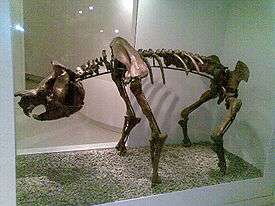Zygomaturus
| Zygomaturus Temporal range: Pleistocene | |
|---|---|
 | |
| Z. tasmanicus on display | |
| Scientific classification | |
| Kingdom: | Animalia |
| Phylum: | Chordata |
| Class: | Mammalia |
| Infraclass: | Marsupialia |
| Order: | Diprotodontia |
| Suborder: | Vombatiformes |
| Family: | †Diprotodontidae |
| Subfamily: | †Zygomaturinae |
| Genus: | †Zygomaturus Macleay, 1857 |
| Species | |
|
†Zygomaturus diahotensis | |
Zygomaturus[1] is an extinct genus of giant marsupial from Australia during the Pleistocene.
Description


It was a large animal, weighing 500 kg (1100 lbs) or more and standing about 1.5 m (4.9 ft) tall and 2.5 m (8.2 ft) long.[2] Much like a hippopotamus, the animal had raised nostrils. Like the wombat, it also had a backwards-facing pouch, which protected its infants (referred to as "joeys") from drowning while the animal was foraging in swamps.
Palaeobiology
It had a heavy body and thick legs and is believed to be similar to the modern pygmy hippopotamus in both size and build.[3] The genus moved on all fours.[3] It lived in the wet coastal margins of Australia and became extinct about 45,000 years ago.[3] Zygomaturus also is believed to have expanded its range toward the interior of the continent along the waterways.[3] It is believed to have lived solitarily or possibly in small herds. Zygomaturus probably ate reeds and sedges by shovelling them up in clumps with its lower incisor teeth.[3]
Related genera
References
- ↑ Literal translation "Big cheekbones"
- ↑ http://www.megafauna.com.au/view/megafauna/zygomaturus-trilobus/
- 1 2 3 4 5 Ellis, Richard (2004). No Turning Back: The Life and Death of Animal Species. New York: Harper Perennial. p. 101. ISBN 0-06-055804-0.
Further reading
- Wildlife of Gondwana: Dinosaurs and Other Vertebrates from the Ancient Supercontinent (Life of the Past) by Pat Vickers Rich, Thomas Hewitt Rich, Francesco Coffa, and Steven Morton
- Marsupial Nutrition by Ian D. Hume
- Long, J.; Archer, M.; Flannery, T.; Hand, S. (2002). Prehistoric Mammals of Australia and New Guinea: One Hundred Million Years of Evolution. University of New South Wales Press. pp. 98–99. ISBN 978-0-8018-7223-5. OCLC 49860159.
- Life of Marsupials by Hugh Tyndale-Biscoe
- Magnificent Mihirungs: The Colossal Flightless Birds of the Australian Dreamtime (Life of the Past) by Peter F. Murray, Patricia Vickers-Rich, and Pat Vickers Rich
- Classification of Mammals by Malcolm C. McKenna and Susan K. Bell
- Australia's Lost World: Prehistoric Animals of Riversleigh by Michael Archer, Suzanne J. Hand, and Henk Godthelp
- World Encyclopedia of Dinosaurs & Prehistoric Creatures: The Ultimate Visual Reference To 1000 Dinosaurs And Prehistoric Creatures Of Land, Air And Sea ... And Cretaceous Eras (World Encyclopedia) by Dougal Dixon
- The Illustrated Encyclopedia Of Prehistoric Life by Dougal Dixon